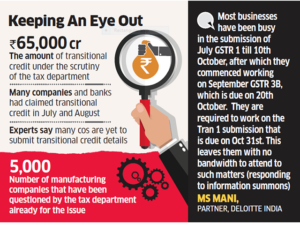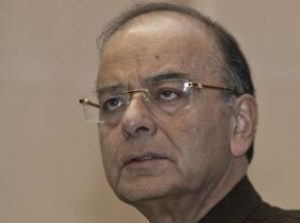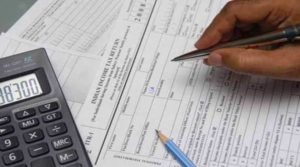
The tax department has sought explanations from banks and financial institutions, including multinationals, on transitional credit claimed by them in July under the goods and services tax (GST) regime, two people with direct knowledge of the matter said. Deputy commissioners and assistant commissioners (central tax) have issued ‘information summons’ in the last seven days seeking data in five specific areas “by e-mail/hard copy”.
These include past sales tax records; summary of closing balance of tax (as of June); description of the nature of credits; details of vendor invoices prior to July 1; and details of payments made to vendors and service providers after July 1. Transitional credit refers to tax credits on sales tax, excise and valued-added tax accumulated before July 1 on pre-GST stock.
Such credit can be set off against liabilities of the July-started GST.
Taxmen suspect some companies are misusing the provision and have filed fake returns to claim high transitional credits. Of the total Rs 95,000 crore GST collected in July, about Rs 65,000 crore was claimed in refunds or transitional credit. The move comes about two weeks after tax officers questioned manufacturing companies on transitional credit claimed by them.
ET was the first to report on September 21that about 5,000 such companies had been questioned by the taxman over transitional credit claims. For now, tax officers are only scrutinising transition credit for sales tax and excise. The data obtained from the banks and financial institutions will be examined for any discrepancies.
The firms said they haven’t been given much time to provide the information. “We had received the notice few days back and haven’t been able to submit it due to the enormity of information sought,” said the finance head of a major multinational bank. “A tax officer called me today (on Friday) and asked me to submit the required documents by Saturday.”
The finance head cited the tax officer as saying the transitional credit claimed by the bank was high. “I tried to explain that transitional credit has to be viewed in the context of our monthly tax outgo. But we will be submitting the required information nevertheless by Saturday,” he said. Experts said many companies are yet to submit transitional credit details, which has to be done through the Transform.
“Since the date for filing the Tran-1 form has been extended to October 31, it would be prudent to commence any enquiries thereafter,” said MS Mani, partner, Deloitte India. “It is advisable to consider the data submitted in the Tran-1 form and then enquire into those cases where any anomalies are detected instead of subjecting the entire data submitted by erstwhile service tax payers to any form of scrutiny.”
The pressure on tax officials increased after a letter by a senior member of the Central Board of Excise and Customs (CBEC) was sent on Wednesday to all tax commissioners. ET has seen the letter. “In view of the urgency of the matter kindly have the verification of transitional credit completed on priority (in respect of list of taxpayers forwarded on 11/9/2017) and a report on the same to be sent on this office not later than 15/10/2017,” the letter read. The letter also asked tax officers to submit a detailed analysis of transitional credit claims. This is expected to be submitted by November 3.







